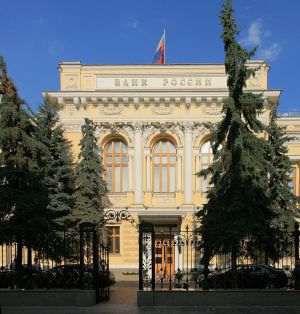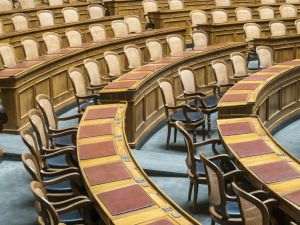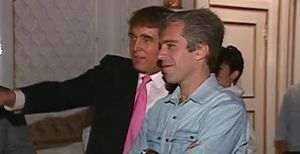Romania can exit the crisis by itself. The only condition would be for them to be free from the state from an economic point of view. It"s not just the post WW2 socialism, but the so called market economy of these last 20 years that proves it: the political factor is the single most important impediment to growth. The state can not offer solutions because it represents the problem.
The "anticrisis programs", regardless of their nature, will only cause an increase of our debt, and impose an economic structure which will be incapable to generate the revenues needed to pay it back, let alone cause economic development.
Who"s going to "help" us after the IMF will most likely stop the disbursement of the next tranches? Latvia showed us the way to the crisis, and now, on the brink of a social explosion, it also shows us the possible future of the agreement with the IMF. The money from the World Bank will be spent in the net 12 months, according to a statement by Robert Zoellick, and foreign investments are receding at an accelerating rate, with no reversal of such trend in sight. Building domestic capital step by step represents our only chance, under the circumstances.
If the government, the president and the Central Bank can"t do anything to help Romania escape the crisis, according to the statements of president Traian Băsescu, why don"t the authorities leave Romanians try and do it themselves? Do we wait for the new "competent people" of the NBR? Or for the new government?
It was the president again who said that Romania will exit the crisis one year after the USA and 6-9 months after the EU countries. Such accuracy astounds, but what has America got to say about that?
Official forecasts from Washington are indeed optimistic. Their credibility is guaranteed by the Federal Reserve and the Obama administration.
However, the business environment is ruled by pessimism. Kenneth Langone, co-founder of Home Depot and former member on the board of the NYSE, said for Bloomberg that the United States are at the eye of a "horrible economic storm", and the government is lying to the population, because the worst is just beginning. In Langone"s opinion, the fiscal stimulus represents a scam.
It"s hard to contradict him, when local Rhode Island press writes that the money allocated is used for the construction of a skateboarding track, just as the town in question (author"s note: Pawtucket, according to daily "Providence Journal") has a budget deficit of 10 million dollars and can no longer pay its police force or its firemen. Is this an isolated case of stimulating the economy?
The USA Economic Activity Index, published by the Institute for Supply Management, shows a slowdown in the growth of the US manufacturing industry, while prices are under extreme pressure. "Will optimistic strategists on Wall Street change their opinion?", David Rosenberg, chief economist at Gluskin Sheff wonders. "Will their masters let them?", the same Rosenberg asks in a recent analysis.
The low chance for a recovery of the American economy is reflected by the continued unemployment growth, the real rate of which reached 17% in September. The fuel of the US economy, consumer credit, continues its accelerated decline, with an annual rate of 4.4% in September, after a 4.1% decline the previous month.
Christopher Whalen, executive director at Institutional Risk Analytics, brings forward even more pessimistic estimates for the following months. In his opinion, "the real economy is dying and everyone is running towards stocks and bonds because they are still liquid". Whalen predicts a "bloodbath" for the American banking sector in the last quarter of 2009. "When you see how the markets are rising when the economy is shrinking, you realize the recovery will not last", Christopher Whalen said.
His opinions are confirmed by a recent report of the Federal Reserve, which says that American banks are postponing writing down their losses on their commercial real estate loans, due to concerns tied to capital preservation, according to the Wall Street Journal.
The developed economies of the EU saw production and industrial orders resume their decline at an accelerated pace, and the head of Soffin, the institution that administers the fund which supports the German banking system, claims the end of the banking crisis is still far away.
However, the biggest danger lies with the budget deficits. For certain developed economies, their sizes make it impossible to finance themselves without an unprecedented printing of currency, the effects of which can only lead to hyperinflation.
This is who we"re waiting for a signal from? During the session for the hearing of the candidates for the board of administration of the NBR, governor Isărescu said that the agreement with the IMF represents an "import of credibility", and foreign funding has the chance "of adding just a little cohesiveness to economic policies". Unfortunately, the credibility deficit is not that easily recovered as the current account deficit is. It has been growing these past two decades, and the foreign "aids" will be a burden for our fragile "economy".
As for cohesiveness? Regardless of their political orientation, post-1989 governments showed they don"t have a clue what the term means. There is also the matter of corruption, which can not be eliminated without removing the state from the economic process.
This monstrous apparatus will never do anything but act for itself and for expanding its "functions". In a true republic, the only role of the state is to defend ownership, to maintain public order and to protect the country"s border. But what about healthcare and education? After 20 years of reform, the answer comes in the form of yet another question: what healthcare, what education?
Durable economic development can not happen in Romania without a radical revision of the Constitution. The new Constitution would have to explicitly guarantee upholding fundamental citizen rights, just like the Constitution of the US does, not make up special rights for specific social layers, which would create obligations for others, and to drastically limit the overall functions of the state, by imposing a permanent budget balance.
American writer and philosopher Eric Hoffer wrote that "those who have enough power can not only make prophecies and make them come true, but they can also lie and turn their lies into truth". This crisis took away from the authorities the privilege of turning their lies into truth.
Even though the above proposals would induce a powerful procyclical stimulus in the economy, which would cause extremely painful effects in the short term, there are no easy solutions. The alternative - government programs - only promises turning acute pain into a chronic one. What will we choose?
Note: This article represents the author"s point of view, does not reflect or imply the opinions of the institution that employs him and does not represent an investment recommendation.




























































